De Duitse schrijfster Zsuzsa Bánk werd geboren op 24 oktober 1965 in Frankfurt am Main. Zie ook mijn blog van 24 oktober 2009.
Uit: Unter Hunden
“In einem Haus lebten wir, einem Haus mit roter Fassade, mit fünf oder sechs Stockwerken, Familien über uns, unter uns, übers Haus verteilt, mit ihren Kindern, hinter jeder Tür drei oder vier, mit ihren Großeltern, die an den Fenstern standen, um hinauszusehen auf die Autobahn, auf Strommasten und die wenigen Wege, die hinaus aus dieser Siedlung führten. Kai gehörte zu einer dieser Familien, einer Familie aus Brüdern, in einem dieser Häuser, mit blaßblauer Fassade, auf der anderen Seite der Straße, hinter den Spannungskästen, dort, wo die Züge in die Stadt fuhren und wir uns manchmal, an den Abenden, über die Gleise stießen. Kai, mit einer Mutter, die wir selten sahen, und die Tüten in den Händen hielt, drei, vier in jeder Hand, wenn sie die Straße hinablief, nach ihren Einkäufen, und nie geradeaus schaute dabei, bloß nach unten, auf den Weg, auf die Steinplatten vor ihren Füßen, als hätte sie Angst zu stolpern. Kais Mutter, mit diesem Haar, über das man sagte, sie solle es färben, und mit diesem Ruf, weil man glaubte, jedes ihrer Kinder sei von einem anderen. Ihre jüngeren Söhne gingen auf die schlechten Schulen, die älteren saßen vor den Hauseingängen, unter den Rissen im Vordach, auf Möbeln, die irgendwer auf den Müll geworfen hatte.
Immer umgab sich Kai mit zwei, drei Jungen aus der Straße, die ihm blind folgten. Sie zogen mit ihm über Felder, stahlen sich in Hauseingänge, versteckten sich auf Speichern, hinter Türen aus Holzlatten, bis sie jemand verscheuchte. An den Nachmittagen dieses Sommers, an den ich denke, saßen sie neben Kai auf einer Bank, auf diesem Platz, auf dem wir uns alle trafen. Sie saßen dort, ohne viel zu reden, bis in den Abend hinein, wenn sie allein zurückblieben, weil sich der Platz leerte und wir anderen in Hauseingängen verschwanden, hinter roten und blauen Fassaden. Wenn wir sie kommen sahen, schon von weitem, Kai und die anderen, mit ihren Hunden, die sie von der Leine ließen, standen wir von der Bank auf und gingen weiter. Es war etwas an ihnen, das uns bedeutete, es ist nicht gut, ihnen gegenüberzustehen, es ist nicht einmal gut, an ihnen vorbeizulaufen. Kai sprach kaum, meist bewegte er nur sein Kinn, seine Hand, aber jeder verstand seine Gesten, selbst die winzigen, die kaum sichtbaren, und daß es zu spät war, den Platz zu verlassen, wenn Kai und die anderen nähergekommen waren, auch das verstand jeder.”

Zsuzsa Bánk (Frankfurt am Main, 24 oktober 1965)
De Duitse dichter Karl August Georg Maximilian Graf von Platen-Hallermünde werd geboren op 24 oktober 1796 in Ansbach. Zie ook mijn blog van 24 oktober 2006 en ook mijn blog van 24 oktober 2007 en ook mijn blog van 24 oktober 2008 en ook mijn blog van 24 oktober 2009.
Tristan
Wer die Schönheit angeschaut mit Augen,
Ist dem Tode schon anheimgegeben,
Wird für keinen Dienst auf Erden taugen,
Und doch wird er vor dem Tode beben,
Wer die Schönheit angeschaut mit Augen!
Ewig währt für ihn der Schmerz der Liebe,
Denn ein Tor nur kann auf Erden hoffen,
Zu genügen einem solchen Triebe:
Wen der Pfeil des Schönen je getroffen,
Ewig währt für ihn der Schmerz der Liebe!
Ach, er möchte wie ein Quell versiegen,
Jedem Hauch der Luft ein Gift entsaugen
Und den Tod aus jeder Blume riechen:
Wer die Schönheit angeschaut mit Augen,
Ach, er möchte wie ein Quell versiechen!
Farbenstäubchen auf der Schwinge
Farbenstäubchen auf der Schwinge
Sommerlicher Schmetterlinge,
Flüchtig sind sie, sind vergänglich
Wie die Gaben, die ich bringe,
Wie die Kränze, die ich flechte,
Wie die Lieder, die ich singe:
Schnell vorüber schweben alle,
Ihre Dauer ist geringe,
Wie ein Schaum auf schwanker Welle,
Wie ein Hauch auf blanker Klinge.
Nicht Unsterblichkeit verlang ich,
Sterben ist das Los der Dinge:
Meine Töne sind zerbrechlich
Wie das Glas, an das ich klinge.
Saul und David
Der König sitzt auf seinem Throne bang,
Er winkt, den Sohn des Isai zu rufen:
»Komm, Knabe, komm mit deinem Harfenklang!«
Und jener läßt sich nieder auf die Stufen.
»Der Herr ist groß!« beginnt er feierlich,
»Geschöpfe spiegeln ihres Schöpfers Wonne;
Der Morgen graut, die Wolken teilen sich,
Und wandelnd singt ihr hohes Lied die Sonne.
Die schwere Krone löse dir vom Haupt
Und tret hinaus in reine Gotteslüfte!
Die Lilie prangt, der Busch ist neu belaubt,
Die Reben blühen und verschwenden Düfte.
Zwar bin ich nur ein schlichter Hirtensohn,
Doch fühl ich bis zum Himmel mich erhoben;
Was mußt du fühlen, König, auf dem Thron,
Wie muß dein Herz den Gott der Väter loben!
Doch deine Wimper neigst du tränenschwer,
Daß sie des Auges schönen Glanz verhehle –
Wie groß ist Jehova! o blick umher!
Und welche Ruhe füllt die ganze Seele!
So laß dein Herz an Gott, so laß dein Ohr
An meiner Töne Harmonie sich laben!«
Allein der König springt in Wut empor
Und wirft den Spieß nach dem erschrocknen Knaben.
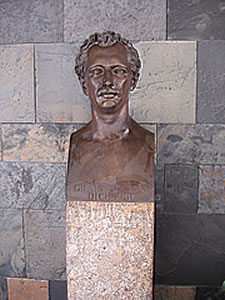
August Graf von Platen (24 oktober 1796 – 5 december 1835)
Buste in Ansbach (Platengymnasium)
De Nederlandse dichter Onno Kosters werd geboren op 24 oktober 1962 in Baarn. Zie ook mijn blog van 24 oktober 2007 en ook mijn blog van 24 oktober 2008 en ook mijn blog van 24 oktober 2009.
Ik droomde dat ik dood was
Maar dood was het woord niet,
Je liet me tenslotte het leven;
en droomde is het woord niet.
Meer of je een brief schrijft
waar je weken over doet.
brief als poging tot dagboek, dezelfde devotie;
brief waarin je terugkomt
op eerder ingenomen standpunten
en deze dan opnieuw inneemt;
kiezels die je ophoest en weer doorslikt.
Quitte
En schrijven wij tenslotte vandaag de dag
niet de dag dat de dood om het leven kwam
en dat wij verstoord om en op keken:
ons heen en van ons
o zo gedrukt bestaan –
wat wil je? (Wat wil-ie?)
Een fooi? Meegaandheid?
Een roos verkopen? Meelij?
De dood kwam om het leven
die dag in dat onzinnig
zuinig verlicht cafe.
Jij knakt je meelij, jij koopt een roos –
je klatert op tafel je fooi en gaat mee
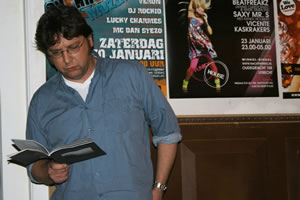
Onno Kosters (Baarn, 24 oktober 1962)
De Amerikaanse schrijver Norman Rush werd geboren op 24 oktober 1933 in San Francisco. Zie ook mijn blog van 24 oktober 2008 en ook mijn blog van 24 oktober 2009.
Uit: Mating
“Well before you see water you find yourself walking through pure vapor. The roar penetrates you and you stop thinking without trying.
I took a branch of the path that led out onto the shoulder of the gorge the falls pour into. I could sit in long grass with my feet to the voice, the falls immense straight in front of me. It was excessive in every dimension. The mist and spray rise up in a column that breaks off at the top into normal clouds while you watch. This is the last waterfall I need to see, I thought. Depending on the angle of the sun, there were rainbows and fractions of rainbows above and below the falls. You resonate. The first main sensation is about physicality. The falls said something to me like You are flesh, in no uncertain terms. This phase lasted over an hour. I have never been so intent. Several times I started to get up but couldn’t. It was injunctive. Something in me was being sated and I was paralyzed until that was done.
The next phase was emotional. Something was building up in me as I went back toward the hotel and got on the path that led to overlooks directly beside and above the east cataract. My solitude was eroding, which was oddly painful. I could vaguely make out darkly dressed people here and there on the Zambia side, and there seemed to be some local African boys upstream just recreationally manhandling a huge dead tree into the rapids, which they would later run along the bank following to its plunge, incidentally intruding on me in my crise or whatever it should be called. The dark clothing I was seeing was of course raingear, which anyone sensible would be wearing. I was drenched.
You know you’re in Africa at Victorial Falls because there is nothing anyplace to keep you from stepping off into the cataract, not a handrail, not an inch of barbed wire. There are certain small trees growing out over the drop where obvious handholds on the limbs have been worn smooth by people clutching them to lean out bodily over white death. I did this myself. I leaned outward and stared down and said out loud something like Weep for me. At which point I was overcome with enormous sadness, from nowhere. I drew back into where it was safe, terrified.”

Norman Rush (San Francisco, 24 oktober 1933)
De Engels – Amerikaanse dichteres Denise Levertov werd geboren op 24 oktober 1923 in Ilford, Essex. Zie ook mijn blog van 24 oktober 2008 en ook mijn blog van 24 oktober 2009.
February Evening In New York
As the stores close, a winter light
opens air to iris blue,
glint of frost through the smoke
grains of mica, salt of the sidewalk.
As the buildings close, released autonomous
feet pattern the streets
in hurry and stroll; balloon heads
drift and dive above them; the bodies
aren’t really there.
As the lights brighten, as the sky darkens,
a woman with crooked heels says to another woman
while they step along at a fair pace,
‘You know, I’m telling you, what I love best
is life. I love life! Even if I ever get
to be old and wheezy—or limp! You know?
Limping along?—I’d still … ‘ Out of hearing.
To the multiple disordered tones
of gears changing, a dance
to the compass points, out, four-way river.
Prospect of sky
wedged into avenues, left at the ends of streets,
west sky, east sky: more life tonight! A range
of open time at winter’s outskirts.
The Garden Wall
Bricks of the wall,
so much older than the house –
taken I think from a farm pulled down
when the street was built –
narrow bricks of another century.
Modestly, though laid with panels and parapets,
a wall behind the flowers –
roses and hollyhocks, the silver
pods of lupine, sweet-tasting
phlox, gray
lavender –
unnoticed –
but I discovered
the colors in the wall that woke
when spray from the hose
played on its pocks and warts –
a hazy red, a
grain gold, a mauve
of small shadows, sprung
from the quiet dry brown –
archetype
of the world always a step
beyond the world, that can’t
be looked for, only
as the eye wanders,
found.
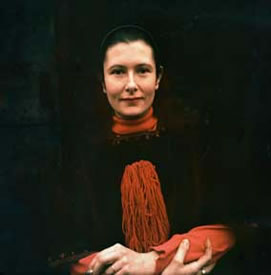
Denise Levertov (24 oktober 1923 – 20 december 1997)
De Vlaamse auteur Ernest Claes werd geboren op 24 oktober 1885 te Zichem. Zie ook mijn blog van 24 oktober 2006 en ook mijn blog van 24 oktober 2008 en ook mijn blog van 24 oktober 2009.
Uit: De Witte
„De Witte keek nu naar ’t raam, en daar kwam zoo medeens met een vluchtig vedergefladder een musch op den wingerdtak zitten, vlak voor de ruit, de pootjes wijd uitschoorend om den buigenden steun, ’t zwarte kopje vlug wippend links en rechts voor mogelijk gevaar, in den dikken bek een lange stroopijl. Met een schok was de lamheid bij de Witte eruit, en zijn oogen gluurden opeens met gespannen aandacht op de musch. Ritsss… ’t vogeltje was weg, en even snel zat de Witte op zijn knieën voor ’t raam om te zien waar het zijn nesteling heendroeg… Daar vloog de kelderkamerdeur weer driftig open.
– ‘As ge potverdekke… Wa zitte doar te doen, bengel?’ hield moeder haar eersten uitroep in, daar ze de Witte in zijn hemd rechtop in zijn bed zag zitten.
– ‘Niks… ik koom ommes!’
– ‘Ge moet et anders moar zeggen as ik oe moet hulpe!’
– ‘Tijd genoeg!’ mokte de Witte, terwijl hij zijn gelapte wekedaagsche broek aantrok, en toen de deur weer even driftig was toegeklakt: ‘’t Es altijd etzelfde!’ Met zijn frak onder den arm stapte hij de kelderkamer af, nam in ’t waschhok, waar ook de koeikuipen stonden, den handdoek van den nagel, hing buiten handdoek en jas over den puthaak, en plonsde zijn twee handen in den emmer water die op de moos stond. Hij peuterde wat aan zijn vuile vingertoppen, schepte dan zijn twee handen vol water, en stroelde het blazend en prasselend over zijn gezicht. Met den drogen tip van den handdoek wreef hij daarna over zijn kaken dat ze er rood van glommen.
Rond de groenbemoste putkuip pikkerden de hennen ongestoord voort. Hij zag over den vlierstruik heen moeder achter in den hof aan de beeten bezig. – En over de weiden en het land rondom groeide de glitsheete zonnedag.
Nu kwam de Witte binnen om koffie te drinken. In de huiskamer hing nog de duffe weepschheid van den morgen, de rolgordijnen waren neergelaten voor de zon die straks op dien kant van ’t huis stond, de vliegen zaten te krieuwelen tegen de zwarte zoldering en de stores, op de muren en op de tafel, en dreven in zachte vlucht door de groote lage kamer. In den haard was ’t vuur uitgebrand, en de zwarte kat zat er naast te slapen, ineengedoezeld, en de oogen dicht toegeknepen alsof ze glunder te peinzen zat aan de voorbije dingen van den nacht. De huisklok zwierde heur langen slinger met de koperen plaat onderaan rustig heen en weer, met lijzigen tiktak, of de dag die zoo pas begon, nog eeuwig lang zou duren en er hoegenaamd geen haast bij was.“

Ernest Claes (24 oktober 1885 – 2 september 1968)
Claes en De Witte in Zichem
De Ierse dichter en essayist Robert Greacen werd geboren op 24 oktober 1920 in Derry. Zie ook mijn blog van 24 oktober 2008.
Captain Fox (Fragment)
Captain Fox sits readin g metaphysics –
Hegel’s the hundred watt bulb in his world.
Captain Fox is fond of Zürichs Hotel Excelsior.
A reliable place,’he says, ‘solid, reliable’.
He lights a Gauloise and blows a ring:
One of these days I’ll retire, I’m getting too old
For buggering along the autobahns.
Besides, I want to write a pre-Ayer work on philosophy
Which I’ll finish and publish at my own expence.
Aspects of Hegel or some such title
Perhaps a village on the Adriatic…
Basques, Catalans, Slovaks, Irishmen, Blacks,
These are Captain Foxes’ friends
Luckily he’s as much linguist as philosopher.
He talks for hours about fireworks
And the poetry of Rainer Maria Rilke.
Truly a civilised man, Captain Fox.
‘Are you in business?’, I once asked him.
‘Well, let’s say I provide…facilities’.
A most civilised man, Captain Fox,
Discreet, solid, reliable.
His business isn’t my business.
Flying Into Atlanta
A velvet evening at fall’s end,
Day in retreat, I flying high
Look down on diamond lights.
John Keats, come with me now.
Let’s travel in these realms.
Un-misted, mellow, fruitful,
And drink from brimming beakers
Above this city’s radiance,
Nor speak of hemlock, nightingales,
Or northern islands we have fled.
Through this rich Georgian sky
We’ll ride in dazzlement
Deep in romantic images
Yet hear a voice proclaim:
O my America, my new-found land!
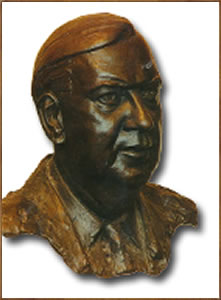
Robert Greacen (24 oktober 1920 – 13 april 2008)
Buste gemaakt door Robin Buick, 1987
De Canadese schrijver, politiek activist, essayist en filmmaker Hubert Aquin werd geboren 24 oktober 1929, in Montreal, Quebec. Aquin studeerde af aan de universiteit van Montreal in 1951. Van 1951 tot 1954 studeerde hij aan het Institut d’etudes politiques in Parijs. Bij zijn terugkeer naar Montreal werkte hij toto 1959 voor Radio-Canada. Van 1960 tot 1968 was Aquin actief in de beweging voor onafhankelijkheid van Quebec. In 1964 kondigde hij aan dat hij “ondergronds” zou gaan om d.m.v. terrorisme voor de onafhankelijkheid te strijden. Hij werd kort daarna gearresteerd en verdween voor vier maanden in een psychiatrisch ziekenhuis. Het was daar dat hij zijn eerste roman, Prochain episode, het verhaal van een gevangen revolutionair schreef. In december 1964 werd hij vrijgesproken van illegaal bezit van een vuurwapen. Prochain episode wordt beschouwd als een klassieker van de Canadese literatuur. De zelfdestructieve gedachten van verteller van de roman zijn een voorbode van Aquins eigen dood. Op 15 maart 1977 schoot hioj zichzelf door het hoofd. Hij liet een afscheidsbrief na waarin hij zijn dood een vrije en positieve keuze noemde: “I have lived intensely, and now it is over.”
Uit: Trou de mémoire
„J’ai désappris- avant de naître- les danses de guerre de mon peuple conquis par des Français en dentelle qui, une fois encabanés ici, ont été conquis inlassablement et infiniment sur écran géant avec sous-titres en anglais.
Deux fois conquis … je suis en quelque sorte le spécialiste de la conquête: j’en connais par coeur toutes les modalités d’application et tous les épisodes paranoïdes. La conquête, ça me connaît; car j’ai eu le temps, depuis le temps, d’explorer cet état constitutionnellement oscillatoire et cet aller et retour écoeurant entre l’exaltation et la narcose, entre une tentative de révolution et une tentative de suicide- ce dernier rendu impossible par la perfusion du fameux poison résurrectionnel qu’on s’empresse de combattre, aussitôt qu’il est inculqué, par une injection surdosée de sulfonal contre-résurrectionnel qui est suivi de près, selon les ordonnances du conquérant, par l’absorption d’un produit antagoniste, et ainsi de suite … Poison d’abandon contre poison de survivance, cri mort contre cri ressuscité, conquête oui, conquête non!
Le conquis vit entre chien et loup, et, pour lui, chien fidèle, il n’y a qu’un jour au calendrier: un samedi saint sans lendemain … Oui le conquis s’est taillé une toute petite place entre la mort et la résurrection, il est mort et attend dans une espérance régressive et démodée un jour de Pâques qui ne viendra jamais. Il se trouve coincé fortuitement entre deux événements: sa mort passée et son impossible résurrection pascale. … Le conquis, confiné à l’attente visqueuse, se suicide sans dérougir et se ranime sans cesse, fatigué à la longue de tuer ce qui est mort en lui et d’exaspérer la fraction d’existence qui lui est déférée … La seule compensation du conquis absolu serait de comprendre pourquoi et de quelle incroyable façon il se fait enculer par l’histoire; mais justement, par définition, il a perdu la vue.“

Hubert Aquin (24 oktober 1929 – 15 maart 1977)
De Bulgaarse schrijver Yordan Radichkov werd geboren op 24 oktober 1929 in het dorp Kalimanitza, in de provincie Montana. Sommige literaire critici noemen hem de belangrijkste figuur in de Bulgaarse literatuur in het laatste derde van de 20e eeuw en zijn werk is vergeleken met dat van Kafka of Gogol. Hij begon zijn carrière als regionale correspondent voor de krant Národná mladezh (Nationale Jeugd) en nam later ook redactionele taken over. Radichkov begon met het schrijven van korte verhalen voor de krant Vecherni novini (Avond Nieuws) en zijn vroege collecties trokken de aandacht van de lezers en critici door hun lyrische beschrijvingen en hun directheid. In 1959 publiceerde hij zijn eerste volledige boek, Sarczeto Bie za horata (Het hart klopt voor het Volk), gevolgd door Prosti rutse (Eenvoudige handen, 1961) en Oburnato nebe (Eng: A Sky Turned Upside Down, 1962), allemaal geschreven in de officiële socialistisch-realistische stijl. Deze stijl werd geleidelijk vervangen door een stijl van parodie en van het groteske, met een toename van folkloristische elementen, waaronder volkse fantasie en humor.
Uit: The Bowler-Hat
“Before I go on with the Bowler-hat, I would like to share some explanations to his majesty reader.
The question why I have to write about the Bowler–hat, but not for man, arise fairly!
Of course, I also thought about man at first, but the more I learnt about him, the more he was getting old and became colourless. It seems to me that one day he died. The man did not wanted to die at all and in order to protect himself from this unpleasant experience or to put it away from himself at the first chance, he slept very carefully, he ate very carefully, also he was very carefully in conference, he sneezed, traveled and sometimes he expressed himself extremely in a vivid style, in the sense that we bear big responsibilities and we have to be conscious about these responsibilities. But although his vivid style of expression, and although he ate, slept, shaved or reproduced himself, it seems to me that the man died.
And the Bowler-hat stayed!
It did not shave; neither ate, nor sneezed – did not even know the alphabet, and stayed. The world is full of similar injustices. Is it possible that everything around us, which did not suffer, did not eat, did not deliver speeches and did not bear responsibilities, will stay, and we will not stay. The why we have been creeping on the rough surface of life! Is it just left a hillock, just one overgrown with grass similarity of a bowler–hat and with „Hats down!” to end our earthly way? Have we ever thought sometimes that at the end of our lives we turn to our hats again and the hats are the ones, which pay tribute to us?
But let’s go on!
The Bowler–hat in question came to Bulgaria thanks to one Bulgarian. During his visit to Italy in the World War II the Bulgarian bought the Bowler-hat, because only a stupid man would enter Italy, without going out of it without a bowler-hat. Italy was at that time a nice place. Mussolini has not started yet sewing seeds in town parks and thrashing it on the squares of Rome.
The Bowler-hat was „Borsallino” and we have to notice, that then it was the Mount Everest of the bowler-hats (Europeans called the Mount Everest the highest peak in the world, Chomolungma; it has not been climbed by Tensing and Hillary yet and engulfed many expeditions in its glaciers). Italians kept the secret about the way the material for the producing of bowler–hats was made, that is why their bowler-hats were the lightest in the world.”
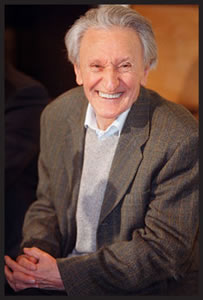
Yordan Radichkov (24 oktober 1929 – 21 januari 2004)
De Engelse dichter , dramaturg en schrijver Adrian Christopher William Mitchell werd geboren in Hampstead Heath op 24 oktober 1932. Zie ook mijn blog van 24 oktober 2009.
Remembrance Days
I can remember the love in my mother’s blue eyes
as she told us about her brothers Sydney and Stanley
and how they were lost in the Great War
and how I thought I would one day go and find
my soldier uncles and I am still searching for them.
I can remember how my dark-eyed father
stared at the floor as he tried to tell me about
his four years in the dead mud of the trenches,
four years in which all his friends were killed.
I can remember when the German bombers came booming over Bath
and my mother took us down to hide in the cellar in our pyjamas..
I can remember when our family friend Major Patterson, so
handsome and three times taller than me, a six-year-old,
staggered back in shreds to eat with us after being rescued from
the chilly madness of Dunkirk.
I can remember being trained by fascist corporals
and sergeants in the RAF to march like a robot
and think like a gun.
Yes, I’ve seen enough war at a distance to make me
hate war more than anything.
And thanks to my mother and my father and my wife and my
children and my grandchildren and my dogs and my cats – I have
seen enough peace to know that only peace can satisfy my heart.

Adrian Mitchell (24 oktober 1932 – 20 december 2008)
De Engelse schrijfster en journaliste Marghanita Laski werd geboren op 24 oktober 1915 in Manchester in een prominente familie van joodse intellectuelen (Neville Laski was haar vader, Mozes Gaster haar grootvader en Harold Laski haar oom), ze werd opgeleid aan Lady Barn House School en St Paul’s Girls ‘School in Hammersmith, werkte in de mode-industrie, maar studeerde later Engels aan Somerville College, Oxford. Zij trouwde met uitgever John Howard (in Parijs), en werkte een tijd in de journalistiek. Nadat haar zoon en dochter waren geboren begon Laski serieus te schrijven. Ook was zij een omnivoor lezer en vanaf 1958 werd ze een vruchtbare en haast dwangmatige leverancier van bijdragen aan de Oxford English Dictionary. Laski schreef ook literaire biografie, toneelstukken en korte verhalen.
Uit: Little Boy Lost
„For insensibly a picture of his son had been forming in his mind. He did not know this; if he tried consciously to imagine a boy who might be his, his conscious mind gave no response. But his unconscious mind retained as the image of his son the child in the snapshot that he had refused send to Pierre, the five-year-old English boy in his grey flannel shorts and blazer, short grey socks, neat brown walking shoes, wide laughing eyes under the grey felt hat, and a cheerful confident grin. In his memory of this picture his deepest expectation of recognition were founded.
But facing him was a thin little boy in a black sateen overall. Its sleeves were too short and from them dangled red swollen hands too big for the frail wrists. Hilary looked from these painful hands to the little boy’s long thin grubby legs, to the crude coarse socks falling over shabby black boots that were surly several sizes too large. It’s a foreign child, he thought numbly, and then he let himself look at the small white face turned towards him, a lock of black hair failing from a travesty of a parting over enormous dark eyes that stared imploringly into his.
He knew that he should have moved towards the child, greeted him naturally and with friendliness. But he could only stand and stare with horror and repulsion, saying wildly to himself, “Why does he look at me like that? He doesn’t know why I’m here. Why does he look at me like that?”
He suddenly remembered as he stood there, trying desperately to move forward to the casual greeting, his Aunt Jessie telling him that in his early childhood, whenever she used to visit him at his home, he would stand by her chair and she would know that he was saying “Please take me back to the farm with you; please take me back to the farm.” But he doesn’t know who I am,” he repeated to himself, and then the door opened behind the child and the Mother Superior came in, a child’s coat over her arm.“

Marghanita Laski (24 oktober 1915 – 6 februari 1988)
De Duitse schrijfster Dorothea von Schlegel werd geboren op 24 oktober 1764 in Berlijn. Zie ook mijn blog van 24 oktober 2008 en ook mijn blog van 24 oktober 2009.
Uit: Florentin
„– »Laß dich umarmen, Schimmel«, sagte er, »du bist ein königliches Tier! ein Tier für Könige! Was fehlt uns beiden, um in der Geschichte verewigt zu werden, du als ein Muster der Treue und Unterwürfigkeit, ich als ein Beispiel von menschenfreundlicher Herablassung, als daß ich einen Thron besäße, und du wärest mein Untertan? Gewiß bist du ganz verwundert und froh, und ohne Zweifel fühlst du dich überaus glücklich, gerade von mir und von niemand anders bis ans Ende deines treuen Lebens geritten zu werden! Ahndest du etwa, daß ich deine Last bloß deswegen etwas leichter machte, damit du mir nicht völlig unterlägst, und darüber zugrunde gingest, ehe ich dich missen kann? Ich weiß es freilich, aber du sollst es nie erfahren, denn du sollst glücklich sein; du sollst, verlaß dich auf meine Wachsamkeit, gewiß nie in dem klugen Glauben gestört werden, daß du in deiner Unvernunft und demütigen Genügsamkeit ein glückliches Tier bist.« –
Er ließ den Kopf des Schimmels, und stand gedankenvoll eine Weile an ihn gelehnt. Sein Auge schweifte umher, bald beschaute es die ihn noch umgebenden Gegenstände mit dem innigsten Vergnügen, bald drang es mit Sehnsucht in die Ferne. Es gab für ihn Momente, wo er sich keines drückenden und keines vergangnen Verhältnisses bewußt war. Ihm war, besonders in der Einsamkeit und im Freien, als hätte er alles, was ihm jemals weh getan, zurückgelassen, und ginge nun einer heitern Aussicht entgegen. Er konnte sich einbilden, vor einem Augenblicke gestorben und mit dieser bessern Empfindung in ein schöneres Dasein übergegangen zu sein. –
»Welche sehnende, ahndende Hoffnung treibt mich wieder zu euch Menschen? Warum ergebe ich mich denn aufs neue euren unsinnigen Anstalten? Ist es mir denn nicht bekannt, daß ich dessen, was ich bei euch suche, schon längst überdrüssig bin?… „
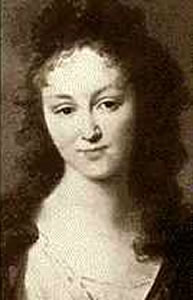
Dorothea von Schlegel (24 oktober 1764 – 3 augustus 1839)
De Amerikaanse dichteres en schrijfster Sarah Josepha Buell Hale werd geboren op 24 oktober 1788 in Newport, New Hampshire. Zie ook mijn blog van 24 oktober 2008.
Uit: Northwood. A Tale Of new England
“Sidney Romelee, the eldest of a numerous family, was a native of New Hampshire. The local situation of the little village in which he was born, offered few temptations to the speculator, and the soil promised no indulgence to the idle; but it abundantly repaid the industrious cultivator. It was therefore inhabited, almost exclusively, by husbandmen, who tilled their own farms with their own hands, laboring actively six days in the week, and on the seventh, offering, to that Being who alone could crown their labors with success, the unfeigned homage of contented minds and grateful hearts. In short, some twenty or thirty years since, the inhabitants of this retired place displayed, in the simplicity and purity of their manners and morals, a model, which Jeremiah Belknap, when describing so admirably what constituted a ” happy society,” might have quoted as an illustration of his “picture.”Among this unsophisticated people, where men are esteemed more for merit and usefulness, than rank and wealth, James Romelee, Esq. the father of our hero, was a very honorable man; yet it was not wealth which gave him consideration, for he was only what is called in middling circumstances, and the deference with which he was treated was the more gratifying as he knew it to be an unpurchasable tribute paid by freemen to his abilities . and integrity. He, like almost all the New England yeomanry, married young, and lived most happily with his wife; for she was the woman of his choice, and truly and faithfully a helpmate in his labors, and a tried and discreet friend, in whose sympathy and counsels he found he might always -fely. When they first came to reside on their farm, it was almost a wilderness; but unremitting industry soon altered its appearance—the thrifty orchard occupied the place of the maple forest, the garden bloomed where the wild briar had sprung, and a comfortable house quite eclipsed the log hut, which had, at first, afforded them shelter.”

Sarah Josepha Hale (24 oktober 1788 – 30 april 1879)
